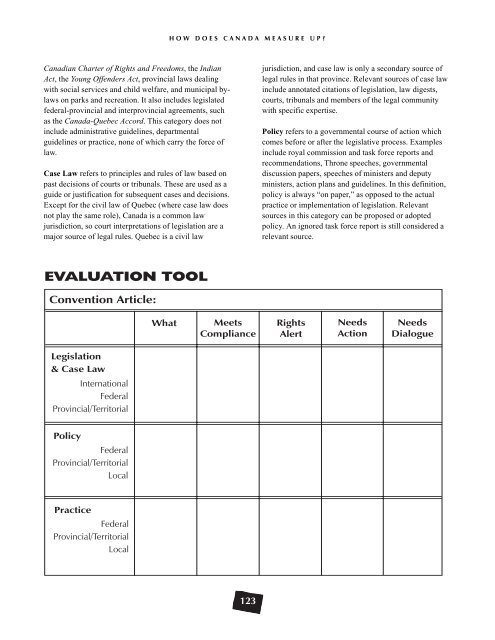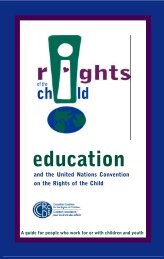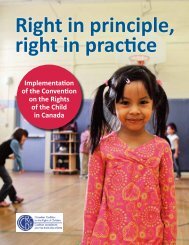Poste - Canadian Coalition for the Rights of Children
Poste - Canadian Coalition for the Rights of Children
Poste - Canadian Coalition for the Rights of Children
You also want an ePaper? Increase the reach of your titles
YUMPU automatically turns print PDFs into web optimized ePapers that Google loves.
<strong>Canadian</strong> Charter <strong>of</strong> <strong>Rights</strong> and Freedoms, <strong>the</strong> Indian<br />
Act, <strong>the</strong> Young Offenders Act, provincial laws dealing<br />
with social services and child welfare, and municipal bylaws<br />
on parks and recreation. It also includes legislated<br />
federal-provincial and interprovincial agreements, such<br />
as <strong>the</strong> Canada-Quebec Accord. This category does not<br />
include administrative guidelines, departmental<br />
guidelines or practice, none <strong>of</strong> which carry <strong>the</strong> <strong>for</strong>ce <strong>of</strong><br />
law.<br />
Case Law refers to principles and rules <strong>of</strong> law based on<br />
past decisions <strong>of</strong> courts or tribunals. These are used as a<br />
guide or justification <strong>for</strong> subsequent cases and decisions.<br />
Except <strong>for</strong> <strong>the</strong> civil law <strong>of</strong> Quebec (where case law does<br />
not play <strong>the</strong> same role), Canada is a common law<br />
jurisdiction, so court interpretations <strong>of</strong> legislation are a<br />
major source <strong>of</strong> legal rules. Quebec is a civil law<br />
H O W D O E S C A N A D A M E A S U R E U P ?<br />
123<br />
jurisdiction, and case law is only a secondary source <strong>of</strong><br />
legal rules in that province. Relevant sources <strong>of</strong> case law<br />
include annotated citations <strong>of</strong> legislation, law digests,<br />
courts, tribunals and members <strong>of</strong> <strong>the</strong> legal community<br />
with specific expertise.<br />
Policy refers to a governmental course <strong>of</strong> action which<br />
comes be<strong>for</strong>e or after <strong>the</strong> legislative process. Examples<br />
include royal commission and task <strong>for</strong>ce reports and<br />
recommendations, Throne speeches, governmental<br />
discussion papers, speeches <strong>of</strong> ministers and deputy<br />
ministers, action plans and guidelines. In this definition,<br />
policy is always “on paper,” as opposed to <strong>the</strong> actual<br />
practice or implementation <strong>of</strong> legislation. Relevant<br />
sources in this category can be proposed or adopted<br />
policy. An ignored task <strong>for</strong>ce report is still considered a<br />
relevant source.




